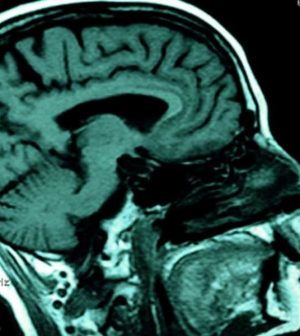- Could Your Grocery Store Meat Be Causing Recurring UTIs?
- Are You Making This Expensive Thermostat Error This Winter?
- Recognizing the Signs of Hypothyroidism
- 10 Strategies to Overcome Insomnia
- Could Artificial Sweeteners Be Aging the Brain Faster?
- Techniques for Soothing Your Nervous System
- Does the Water in Your House Smell Funny? Here’s Why
- Can a Daily Dose of Apple Cider Vinegar Actually Aid Weight Loss?
- 6 Health Beverages That Can Actually Spike Your Blood Sugar
- Treatment Options for Social Anxiety Disorder
How Severe Brain Injuries Might Trigger Dementia

A single traumatic brain injury can raise a person’s risk of dementia, a new study suggests.
“Traumatic brain injury is a leading cause of death and disability in young adults,” said researcher Elisa Zanier, from the Mario Negri Institute in Milan, Italy.
“Moreover, even in milder cases, it represents a risk factor for dementia, such as chronic traumatic encephalopathy (CTE),” Zanier added. “Understanding the mechanism linking an acute mechanical event to a progressive, degenerative brain disease would help the development of new therapies.”
In the study, the researchers analyzed the brain tissue of 15 patients who had survived a year or more after a traumatic brain injury (TBI) and compared that tissue with brain tissue from 15 healthy controls. They found the TBI patients had higher levels of abnormal tau proteins.
An accumulation of abnormal tau proteins can cause brain cell damage and memory problems, the scientists explained.
The researchers also found that in mice, this type of abnormal tau spread from the site of the brain injury to other brain regions. This spread of tau was similar to the spread of prions, the infectious proteins associated with degenerative brain diseases such as Creutzfeldt-Jakob disease.
The study was conducted by researchers at Mario Negri and the University of Glasgow, in Scotland.
“This observation that a single brain trauma is associated with widespread tau deposition in humans and to the formation of a self-propagating form of tau in a relevant animal model provides the first evidence for how a mechanical brain injury might evolve into chronic degenerative brain disease, including CTE,” Zanier said in a University of Glasgow news release.
The new findings, reported July 31 in the journal Brain, suggest that blocking the spread of abnormal tau proteins after brain injury may reduce patients’ risk of long-term brain problems.
The National Football League has acknowledged a connection between football and CTE, according to published reports. Autopsies done on 111 former players revealed that 110 had CTE.
More information
The U.S. National Institute of Neurological Disorders and Stroke has more on traumatic brain injury.
Source: HealthDay
Copyright © 2026 HealthDay. All rights reserved.










